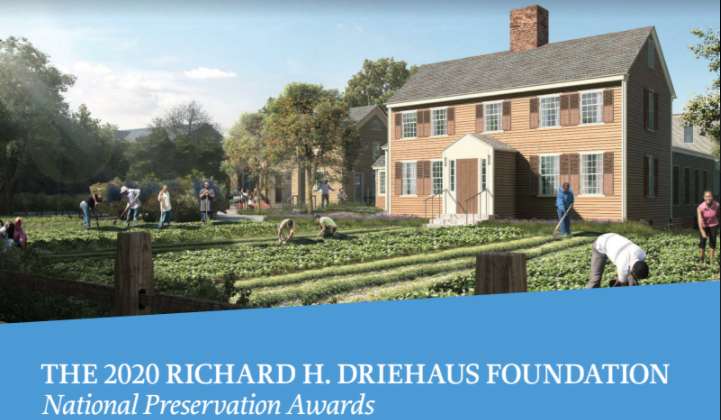
27 Oct 2020 Fowler Clark Epstein Farm Wins 2020 Richard H. Driehaus National Preservation Award
The Fowler Clark Epstein Farm has won one of three 2020 Richard H. Driehaus Foundation National Preservation Awards, to be presented this month by the National Trust for Historic Preservation at its annual conference.
The Driehaus awards are bestowed on historic preservation efforts that demonstrate excellence in preservation practice and partnerships, as well as a transformative impact on the vitality of their communities. The awards are presented annually following a juried competition process. This year’s recipients were honored at the virtual National Preservation Awards ceremony, hosted by television host and preservationist Bob Vila, on October 29, 2020 as part of the National Trust’s annual conference.
According to the National Trust and the Driehaus Foundation:
The Fowler Clark Epstein Farm in Boston, Massachusetts, honored for its innovative adaptive re-use and partnerships, is a rare surviving Federal period farmstead that now serves as a residence, greenhouse, space for educational courses, and productive urban farmland. Historic Boston Inc. (HBI) purchased the property in 2015 after it was the subject of litigation between the Epstein estate and the City of Boston over “demolition by neglect.” To develop a natural re-use for the site that satisfied both historic building preservation and contemporary needs for agricultural uses, a symbiotic partnership among four non-profit organizations evolved that brought the best of each’s expertise to the development and construction of this unique enterprise in the Mattapan neighborhood of Boston. HBI, the Urban Farming Institute, the Trust for Public Land, and North Bennet Street School worked together to carry out the transformation of this distressed 18th century farmstead. The result is a creative urban farming solution that proves the preservation field’s value to important community initiatives, such as reducing unemployment, increasing food access, and building new green space.
The two additional 2020 winners are
-
- the Chelsea District Health Center in New York City, a restoration honored for its reimagining of a crucial community medical center, built as a New Deal era district health center for underserved communities and continuing to serve the same mission in an improved space; and
-
- the Universal Life Insurance Company Building in Memphis, Tennessee, designed in 1947 by the renowned African American architecture firm, McKissack and McKissack for the rapidly expanding Universal Life Insurance Company (ULICO), established in 1923, and eventually the region’s largest black owned companies. ULICO ceased operations in 2000 and an innovative public-private partnership turned the building into offices for the City of Memphis Office of Business Diversity Compliance and Self + Tucker Architects.
For the last five years, the Richard H. Driehaus Foundation National Preservation Awards have honored a broad range of distinguished individuals, businesses, nonprofit organizations, public agencies, and institutions whose collaborations and creativity have preserved the rich history of important places while also contributed to the vibrancy of their communities by ensuring that these places remain dynamic community assets.
According to Paul Edmondson, president and CEO of the National Trust for Historic Preservation, “This year’s recipients’ vividly demonstrate that activating historic places through partnerships and creativity supports the health and vitality of individuals and their communities across the country.”
The winners were selected by an external jury. Jurors include Executive Director of the New York City Public Design Commission, Justin Garrett Moore; Elizabeth MacMillan Director of the National Museum of American History, Anthea M. Hartig; and 94th President of the American Institute of Architects and Principal Emeritus at Quinn Evans, Carl Elefante.
“We are excited to be able to support these National Trust awards, especially during a year that has presented unpredicted challenges for many of us,” said Anne Lazar, Executive Director of The Richard H. Driehaus Foundation. “This year’s winners show the brilliance and breadth of architectural excellence and the deep commitment each winner has to preserving historic spaces, so they may be appreciated for generations to come.”



